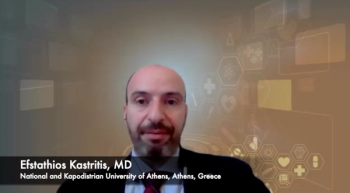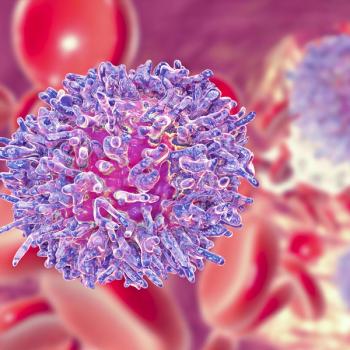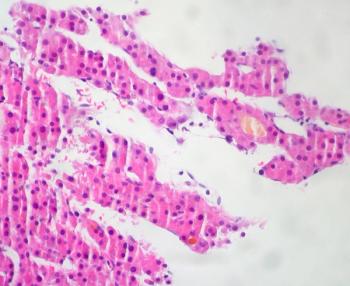
Patients with Wilms Tumor-1–positive ovarian cancer have shown promising response to the combination of galinpepimut-s and pembrolizumab.

Your AI-Trained Oncology Knowledge Connection!


Patients with Wilms Tumor-1–positive ovarian cancer have shown promising response to the combination of galinpepimut-s and pembrolizumab.

At EHA 2021, Shaji Kumar, MD, reflects on the significance of 5-year data from the MAIA study of a daratumumab combination in patients with multiple myeloma.

Catch up on the important updates from CancerNetwork® last week you might have missed in the world of oncology.

Based on its potential to prolong overall survival in patients with glioblastoma multiforme, berubicin was granted fast track designation for the FDA for the treatment of recurrent disease.

Agha emphasized that the annual conference allows investigators to set the foundation for what’s to come in the treatment of multiple myeloma and other hematologic malignancies.

Final overall survival results from TOURMALINE-MM1 failed to show statistical significance of an ixazomib combination for relapsed/refractory multiple myeloma overall.

Hematologic responses improved for patients treated with daratumumab plus VCd versus VCd alone in the ANDROMEDA trial.

Stephanie White, DO, and Preeti Kotha, PharmD, detailed their experiences running the WesternU Health Clinic COVID-19 vaccine program from when vaccines were first approved in the United States until now.

New findings indicate that historically underserved patient populations with renal cell carcinoma are more likely to receive non–guidance-based treatment.

Usmani detailed the primary results from CARTITUDE-1, focusing on overall response rate and stringent complete responses.

Moreau discussed the implications of the second part of the CASSIOPEIA trial at the 2021 ASCO Annual Meeting.

Ibrutinib and venetoclax may prove beneficial in previously untreated chronic lymphocytic leukemia.

Patients who discontinued endocrine therapy early were more likely to have experienced significant mental, physical, and social adverse effects of treatment.

Phase 2 data showed just over half of patients given dual therapy had a major pathological response, compared to just 6.7% of those receiving durvalumab monotherapy.

At the 2021 American Society of Clinical Oncology Annual Meeting, CancerNetwork® spoke with Tanios S. Bekaii-Saab, MD, to discuss recent updates in the treatment of gastrointestinal malignancies.

CancerNetwork® sat down with Salma Jabbour, MD, of Rutgers Cancer Institute, at 2021 ASCO to talk about what she believed was the most interesting and impactful study to come out of the meeting.

Update from a preplanned clinical trial analysis shows promise of devimistat in relapsed/refractory acute myeloid leukemia.

The FDA granted orelabrutinib breakthrough therapy designation for the treatment of relapsed or refractory mantle cell lymphoma.

Data from the phase 3 TULIP trial showed that [vic-]trastuzumab duocarmazine yielded positive progression-free survival for patients with pretreated HER2-positive metastatic breast cancer.

This special edition of the “Oncology Peer Review On-The-Go” podcast hosts Mark Socinski, MD, who discusses important factors in treating and managing extensive-stage small cell lung cancer, and details information from the IMpower133 trial.

Approval of asparaginase erwinia chrysanthemi (recombinant)-rywn represents a long-awaited alternative to E. Coli–derived asparaginase for patients with acute lymphoblastic leukemia.

Joshua Sabari, MD, discussed the approval of amivantiamab as therapy for patients with non–small cell lung cancer harboring EGFR exon 20 insertion mutations.

Patients in the ZUMA-7 trial who were assigned Yescarta (axicabtagene ciloleucel) saw event-free survival by 60% compared to patients who were on a chemotherapy plus stem cell regimen.

Patients with HCC who received atezolizumab/bevacizumab experienced a positive quality of life and improved disease symptoms vs sorafenib.

SNDX-5613 has received a fast track designation from the FDA for the treatment of relapsed/refractory acute leukemias, including acute myeloid leukemia and acute lymphoblastic leukemia.

For the “Oncology Peer Review On-The-Go” podcast, CancerNetwork® sat down with Gilles Salles, MD, to discuss different treatment regimens for transplant-ineligible DLBCL in this special edition episode.

At EHA 2021, Shaji Kumar, MD, reflects on the significance of 5-year data from the MAIA study of daratumumab plus lenalidomide/dexamethasone in patients with newly diagnosed multiple myeloma.

Adult patients with mantle cell lymphoma are not regularly receiving treatment recommended by clinical trial results, according to a real-world study.

CYNK-001, a human placental hematopoietic stem cell–derived natural killer cell infusion, will now be tested in an expanded population following promising results in a phase 1 trial.

18FDG-PET was successful in identifying patients with HER2-positive early-stage breast cancer who were more likely to benefit from chemotherapy-free treatment with trastuzumab and pertuzumab.